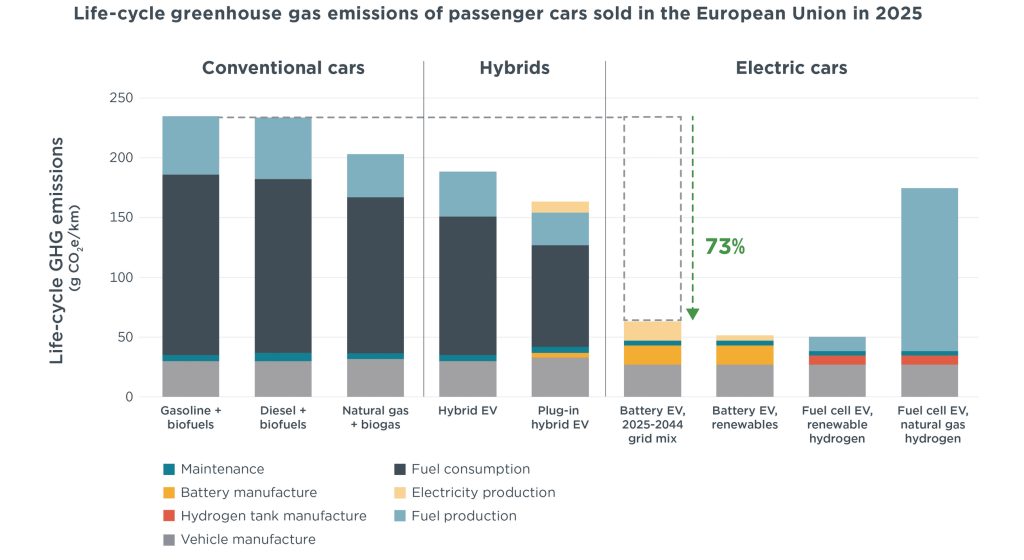As Europe’s electricity mix is getting cleaner, battery-electric vehicles (BEVs) are also offering a larger climate advantage than previously expected, according to the results of a new study released this week.
On Wednesday, the International Council on Clean Transportation (ICCT) released a study noting that BEVs sold today produce 73 percent fewer life-cycle greenhouse gas emissions than internal combustion engine (ICE) vehicles, even factoring in production. This figure also represents a 24-percent improvement upon the organization’s 2021 estimates for this year, meaning that BEVs are getting cleaner more quickly than expected as the continent’s renewable programs continue to grow.
The study was comprised of a comprehensive life-cycle analysis of all major powertrain types, and the results suggest that BEVs are the only widely available powertrain that can slash emissions levels enough to meet climate goals. By contrast, the study’s results suggest that other clean energy powertrains, such as hybrids and plugin hybrids, only have a marginal impact, if any, on reducing the overall climate impact of the transportation sector.
“Battery electric cars in Europe are getting cleaner faster than we expected and outperform all other technologies, including hybrids and plug-in hybrids,” says ICCT researcher Dr. Marta Negri. “This progress is largely due to the fast deployment of renewable electricity across the continent and the greater energy efficiency of battery electric cars.”

Credit: International Council on Clean Transportation (ICCT)
READ MORE ON ELECTRIC VEHICLES: Study reveals hybrids could have up to 4.9x lifetime emissions vs. BEVs
ICCT Senior Researcher Dr. Georg Bieker says he also hopes the analysis can help fight misinformation regarding BEV powertrains. For example, he notes that, while it’s true that manufacturing emissions for BEVs can be up to 40 percent higher than for ICE vehicles, this is quickly offset by an electric automobile after just around 17,000 km (~10,563 miles) of driving.
“We hope this study brings clarity to the public conversation, so that policymakers and industry leaders can make informed decisions,” Dr. Bieker says. “We’ve recently seen auto industry leaders misrepresenting the emissions math on hybrids. But life-cycle analysis is not a choose-your-own-adventure exercise.”
Additionally, the ICCT study covers emissions from both vehicle and battery production, recycling, fuel and electricity production, fuel consumption, and maintenance.
“Our study accounts for the most representative use cases and is grounded in real-world data,” Dr. Bieker adds. “Consumers deserve accurate, science-backed information.”
U.S. EV adoption still on pace to reach 50% by 2030: data
The post EVs getting cleaner more quickly than expected in Europe: study appeared first on TESLARATI.


